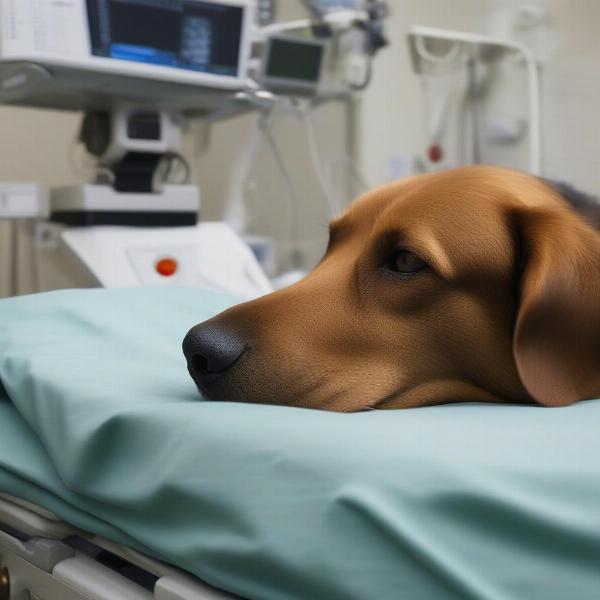A CT scan, also known as computed tomography, is a powerful diagnostic imaging tool used in veterinary medicine to evaluate a wide range of conditions in dogs. It provides detailed cross-sectional images of your dog’s internal organs, bones, soft tissues, and blood vessels, offering valuable insights that traditional X-rays may miss. This comprehensive guide will delve into the uses, benefits, procedure, and costs associated with CT scans for dogs.
Understanding the Need for a CT Scan in Dogs
When your furry friend isn’t feeling their best, a quick diagnosis is crucial. While X-rays offer a good starting point, they sometimes lack the detail needed for a complete picture. CT scans offer a non-invasive way to get that detailed look, helping veterinarians diagnose complex issues and develop effective treatment plans. They are particularly helpful in identifying tumors, internal injuries, and abnormalities in organs like the brain, lungs, liver, and kidneys. If your vet suspects a serious issue, a CT scan might be the key to getting the answers you need.
What to Expect During Your Dog’s CT Scan
The CT scan procedure is generally straightforward and relatively quick. Your dog will need to be sedated or anesthetized to ensure they remain still during the scan. This is crucial for obtaining clear, accurate images. Once sedated, your dog will be positioned on a table that slides into the CT scanner. The scanner rotates around your dog, taking multiple X-ray images from various angles. These images are then compiled by a computer to create detailed cross-sectional images. The entire scanning process usually takes just a few minutes.
 Dog Recovering After CT Scan
Dog Recovering After CT Scan
Deciphering the Results: What a CT Scan Can Reveal
CT scans provide a wealth of information that can help diagnose various conditions. They can detect tumors, both benign and malignant, pinpoint the location and extent of fractures and other bone injuries, and identify abnormalities in internal organs such as the liver, kidneys, spleen, and pancreas. CT scans can also be used to evaluate the cardiovascular system, identifying issues like blood clots or aneurysms. The detailed images obtained from a CT scan can significantly aid in surgical planning and guide treatment decisions.
How Much Does a CT Scan for a Dog Cost?
dog ct scan price can vary depending on several factors, including your location, the complexity of the scan, and whether contrast dye is used. Generally, you can expect to pay anywhere from a few hundred dollars to over a thousand dollars for a CT scan. It’s always best to discuss the costs with your veterinarian beforehand and inquire about any potential payment plans or financial assistance options. how much does a ct scan cost for a dog is a common question, and a transparent discussion with your vet is crucial.
When Is a CT Scan Recommended for Your Dog?
Several scenarios may warrant a CT scan for your canine companion. If your dog has experienced trauma, such as being hit by a car, a CT scan can help assess the extent of internal injuries. Unexplained weight loss, persistent vomiting, difficulty breathing, or neurological problems can also be investigated with a CT scan. Ultimately, your veterinarian will recommend a CT scan if they believe it’s necessary to diagnose or monitor your dog’s condition.
Conclusion
A CT scan is a valuable diagnostic tool in veterinary medicine, providing detailed images that can help diagnose and treat a wide range of conditions in dogs. While the cost can be a concern, the information gained from a CT scan can be invaluable in ensuring your dog receives the best possible care. If your veterinarian recommends a CT scan for your dog, don’t hesitate to discuss any concerns you may have about the procedure, cost, or expected outcomes. ct scan on dog is a valuable procedure that can significantly impact your dog’s health journey. how much is a dog ct scan should be discussed openly with your veterinarian. price of ct scan for dogs can influence your decision-making process.
FAQ
- Is a CT scan painful for my dog? No, the scan itself is not painful. Your dog will be sedated or anesthetized, so they won’t feel anything during the procedure.
- How long does the CT scan take? The actual scanning process typically takes only a few minutes.
- Are there any risks associated with a CT scan for dogs? While rare, there are some potential risks associated with anesthesia, such as allergic reactions. Your veterinarian will discuss these with you beforehand.
- What happens after the CT scan? Your dog will be monitored in a recovery area until the effects of the sedation or anesthesia wear off.
- When will I get the results of the CT scan? Your veterinarian will typically receive the results within a few days and will discuss them with you.
- Can a CT scan be used for all breeds of dogs? Yes, CT scans can be used for dogs of all breeds and sizes.
- Is a CT scan the same as an MRI? No, although both provide detailed images, they use different technologies. Your veterinarian will determine which is most appropriate for your dog.
About ILM Dog
ILM Dog is your trusted international resource for expert dog care and breeding advice. We provide practical, reliable information on all aspects of dog ownership, from breed selection and puppy care to senior dog health, training, nutrition, grooming, and much more. Our goal is to empower dog owners worldwide with the knowledge they need to provide the best possible care for their furry companions. For expert advice and personalized support, contact ILM Dog today! Email: [email protected], Phone: +44 20-3965-8624.